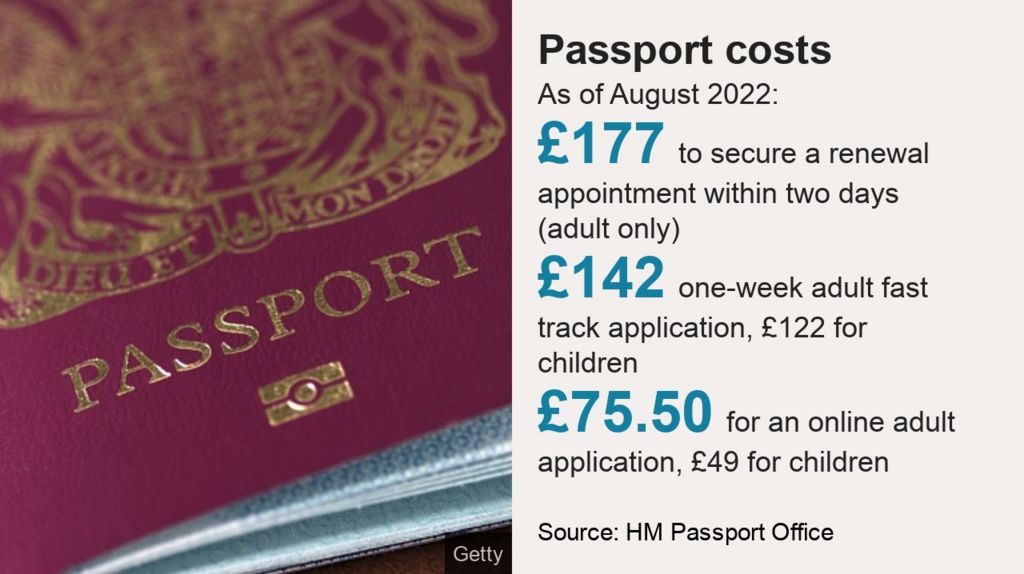BBC News 9 August 2022 - by Lucy Gilder
A backlog of around half a million passport applications is being processed by Her Majesty's Passport Office (HMPO).
Applicants have complained on social media about long waiting times and poor customer service. Many have had to cancel holidays and other summer plans.
How long will I have to wait until my passport is processed?
On 20 July, HMPO Director Thomas Greig said 550,000 applications were waiting to be processed, and the backlog is falling by around 60,000 a week.
Mr Greig wasn't able to say when the waiting times might get back to normal, but indicated it should improve after the summer.
HMPO has said it would prioritise applications that have taken longer than 10 weeks, where the applicant can prove that they are due to travel within the next fortnight, at no additional cost. Applicants can also use HMPO's fast-track services to speed up the process, although there are additional charges for this.
What can I do to avoid my passport being delayed?
The HMPO advice is to apply for a passport far in advance of travel, keeping in mind the ten-week waiting window. It says travel plans should not be made until people have a valid passport to hand.
Applying for a passport online and submitting a high-quality photo can also help reduce the chance of a delay.
Applying for a passport online is cheaper than completing a paper form.
What's causing passport delays in the UK?
HMPO says it expects to receive more than nine million passport applications in 2022 rather than the seven million it usually processes every year.
It says this unprecedented demand, following the easing of Covid restrictions, has led to the delays. Several other problems, such as the eight-to-10 week delay in the recruitment of extra staff, have affected processing times.
Hundreds of thousands of people were mistakenly informed by some airlines that their passports were not valid in Europe and had to be updated - an error that travel expert Simon Calder believes has worsened the backlog.
A post-Brexit rule about expiry dates on passports meant that many UK nationals were prevented from boarding flights to some EU countries. The problem affected people with renewed passports which have an extended expiry date beyond the usual 10 years.
MPs have argued that HMPO was insufficiently prepared to deal with the large influx of applications, after 400,000 passports expired at the start of the Covid-19 pandemic. Only in April 2021 did the Passport Office move from a three to a 10-week processing window to manage the increased demand.
The value for money of subcontractor Teleperformance, which assists with customer service, has also been called into question. The company, whose contract with the Passport Office is worth more than £22m, has faced financial penalties from HMPO for failing to meet call-handling targets.
What is the government doing to address the problem?
The government website lists several measures it has taken to manage the delay:
- Increased staff numbers by 500 since April 2021, with a further 700 to be recruited
- Recruited additional customer care staff to handle calls to the Passport Adviceline
- Contracted more delivery companies to ensure timely delivery of passports and supporting documents
- Increased availability for fast-track appointments and extended working hours
Stephen Kinnock, the shadow minister for immigration, has criticised the government for not intervening sooner despite it knowing, he says, that the Passport Office was underperforming.
The Home Office says HMPO made it clear to people that they should allow up to ten weeks processing time during this period of heightened demand. In the first six months of this year, the Home Office says more than 97% of passport applications were handled within 10 weeks.
HMPO Director Thomas Greig says the Passport Office has "provided a decent service for the vast majority of applicants".

